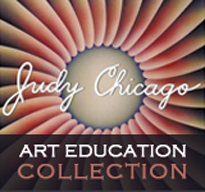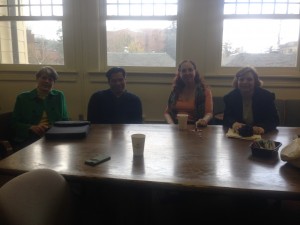Reflections of Tea Time during the academic year 2014-2015
September, 2014
Over some steaming coffee and cups of tea we discussed the frustration of being a woman and an artist simultaneously. Many expressed the difficulties of balancing at home lives with their pursuit of professional artist careers. The affirmation of hearing our stories and understanding similar threads is important to discuss ways of how to engage in practical tactics to resolve these tensions or to simply be a support one to another.
October, 2014
Collaborating on seed ideas for future projects together, sharing what we are reading, discussing and thinking about in relation to feminist theories and the art world through education or studio practice. Sharing our experiences, likes and dislikes about any given topic.
November, 2014
Coming together to plan proposals for upcoming feminist conferences and panel presentations.
Panels include; art education, creative arts process and pedagogy, Judy Chicago art exhibit experiences at PSU, feminism, theory, and research, and arts-based research.
January, 2015
Is it important to identify as a feminist? Why or why not? Does context matter? How do we vary in our definitions of feminist? We discussed these questions and shared relevant art, video, and book resources to help unpack.
February, 2015
As I sit here at our weekly Tea Time with a fellow colleague, we discuss our research and methods and process. As we discuss individual and social transformations, what it means, and how we hope to interact significantly with our field, art and research, we are engaging in an active process of listening and responding. Over our cups of tea, these conversations are meaningful ways of circle dialogue inspiring new perspectives and organizing existing ones. What do our research methods look like? How do we decide what to use? What are our goals?
March, 2015
Our Tea Time this week focused on the topic of navigating personal life with demands of work/student responsibilities and going forward into the work force as graduate students. What obstacles should be expected? As teacher/student relationships, it is important to facilitate discussions about weighing out as many aspects of future decisions and impacts to personal life dynamics. How do personal decisions, such as family, fit into graduate studies and employment searches? In a similar sense, researching and dialogue is important just as our creative progress is developing. How is art studio work impacted through these processes of graduate studies and employment opportunities? What are the power dynamics involved? How are these power dynamics different when contextualized diversely? For example, how does family, self creative art process/work, scholarly goals add to these conversations differently?
April, 2015
When does studio practice need, call for, or push towards conceptual arts in order to expand the boundaries of material and studio work? What does this then mean for studio work and the artist? How is a studio practice consciousness affected in content? Although these questions are complex, they are also simple. Beginning with circle time led discussions where everyone’s voice is heard, listened to, and validated is a huge first step that is many times absent in formal classroom settings.
Our Last Tea Time for the semester: April 27th, 2015
One of the wonderful things about our weekly Tea Time is that new and old friends show up, take a seat, and partake of rich conversation. In our circle we are attentive to each other and in valuing our different perspectives. It was inspiring to share this week n the company of faculty, staff, graduate student, and Mayor Goreham; all coming from our unique experiences. The topics that emerged around the cups of hot tea at the table, were about rape culture, sexual harassment, and violence on campuses. As a society and culture, this is a horrific problem. This topic proved to be complex, delicate, and necessary. Our conversations had multiple layers, touching on issues of race, gender, social activism, socio-economic structures, and repetitive obstacles that are set in place. We felt encouraged in hearing and listening to each other, a brave act in itself as we departed with a little bit of hope in how our stories are valuable in sharing with others to make a little bit of difference.


Leave a Reply
You must be logged in to post a comment.